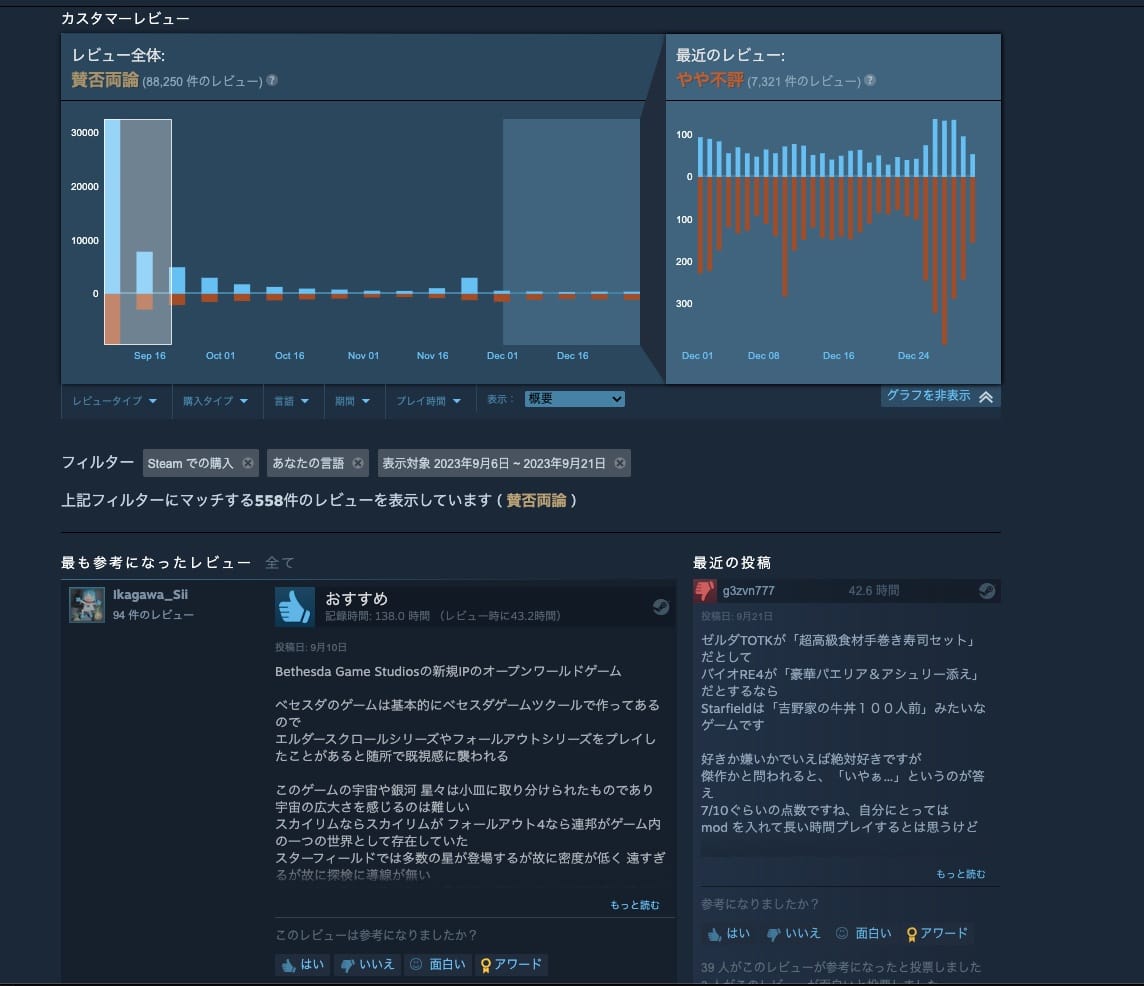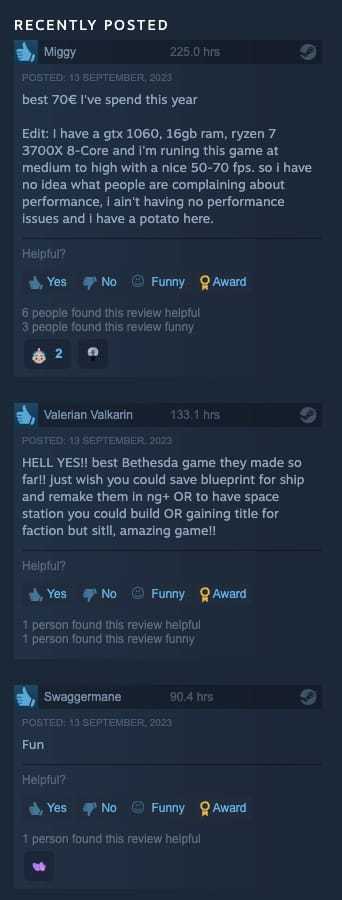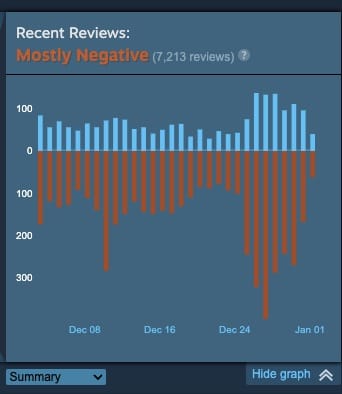Starfield and the Stardust Syndrome: A Tale of Hype and Reality

Dear Reader,
When I noticed Starfields recently “negative” reviews my attention was peaked. Not because I'm a sucker for drama, but because there's something oddly satisfying about digging through the dirt to find the buried truth.
Now, I'm not a data analysts, but even I couldn't help but raise an eyebrow at what I found lurking in the depths of Steam's review API. There's this little gem called the "weighted_vote_score," and let me tell you, it's as intriguing as it sounds.
And before you roll your eyes, no, I'm not suddenly professing to be a data analyst prodigy. But come on, even a layman can see that Steam's data is more polished than your average Joe's Excel sheet. It's almost as if – hold your breath – they've got actual data analysts over there! Mind-blowing, I know.
Now, full disclosure: I've got my own biases here, so don't expect this to be some sterile, impartial analysis. My opinions are going to bleed through these words. But hey, that's half the fun, right? Let's dive into this and see what we can uncover.
tl;dr Found "weighted_vote_score" in Steam API, looks good. "Stardust syndrome" - Initial bias that does not reflect reality.
Introduction and Background: My stake
Skip this part if you're only here for the cold, hard numbers.
So, why am I even bothering with Starfield, you ask? Picture this: I was all set to grab Starfield at launch. I mean, who wouldn't be curious about a game that's been hyped to the stars and back? But then, I saw those trailers. Oh boy, those trailers. It was like stepping into a time machine and not in a good way. The animations? Stiffer than a board. It screamed Fallout 4, and let's not even get started on that trainwreck. That game is comfortably perched on my shelf of 'Bethesda Blunders,' right next to the infamous Fallout 76.
And the NPCs? Their hairstyles looked like they were ripped straight out of a 1940s Fallout vault. Talk about a lack of creativity. But the cherry on top? The price tag. They expected me to shell out a small fortune for this outdated mess? I don't think so.
But then, the reviews started rolling in. Glowing, shining, beaming reviews all over Steam. And let's not forget the YouTube hype train – not that I'd waste my time on those videos.
So, when the sentiment started dropping what did I do? I went data hunting. Not because I cared about the reviews per se – I was convinced the game was a dumpster fire anyway. I wanted to understand the 'why' behind the tidal wave of negativity. Was it just review bombing, or was there more to it?
Analyzing the Steam Data
Time to put on our detective hats and wade through the sea of Steam data. I've looked at 500 reviews from the crucial launch period – yes, I actually did some work for this. You're welcome. And because I'm not about pulling facts out of thin air, I'm attaching the JSON files and URLs for each data set for your snooping pleasure. Feel free to cross-check; I encourage a little skepticism.
The catch? Steam's API has a memory span of a goldfish – only 365 days back.
I used the API and saved all this data on 2023/12/31, enough time to still set the API "day_range" parameter to zero in on those golden 'launch period' reviews, of course.
Set 1
Link: https://store.steampowered.com/appreviews/1716740?json=1&num_per_page=100&day_range=150
File:
Total positive reviews: 45/100 → 45%
Set 2
File:
Total positive reviews: 32/100 → 32%
Set 3
File:
Total positive reviews: 25/100 → 25%
Set 4
File:
Total positive reviews: 27/100 → 27%
Set 5
File:
Total positive reviews: 33/100 → 33%
The Mysterious Case of Steam's Data Discrepancy

Ah, dear reader if you looked at this data and thought why is this happening then you have a good analytical eye. While I don't have all the answers (shocking, I know), let's play detective and make some educated guesses.
My original plan was simple: grab three random sets of 100 reviews each from around the launch window. Easy, right? But, as I sifted through the initial batch of reviews, confusion set in. Something wasn't adding up. Why was I seeing so many negative reviews? So, I shifted my focus to the next 100 reviews, and that's when the lightbulb went off. The data wasn't random; it was organized by something called "weighted_vote_score." And this little detail changes everything.
The data is being ORDER BY weighted_vote_score DESC
{
"recommendationid": "153324227",
"author": {
"steamid": "76561198027020532",
"num_games_owned": 515,
"num_reviews": 29,
"playtime_forever": 2508,
"playtime_last_two_weeks": 0,
"playtime_at_review": 2508,
"last_played": 1702045056
},
"language": "english",
"review": "Starfield is a game that has an excess of nothingness. --<snip>--",
"timestamp_created": 1702237688,
"timestamp_updated": 1702237688,
"voted_up": false,
"votes_up": 1808,
"votes_funny": 19,
"weighted_vote_score": "0.910551190376281738",
"comment_count": 29,
"steam_purchase": true,
"received_for_free": false,
"written_during_early_access": false,
"hidden_in_steam_china": true,
"steam_china_location": ""
},Now, I'm no Steam API expert – this was my first rodeo with it, and did not know API docs existed before this on this point. But here's the kicker: the "weighted_vote_score" from the launch period was eerily accurate in predicting the game's current state. It seems like a more authentic reflection of player opinions than the other metrics.
But how does this score work? One vote is one vote, right? Well, not quite. This "weighted_vote_score" seems to be Valve's secret sauce for sifting through the noise to find the true sentiment of the players. And it's not something you'll see on the usual Steam UI, which tends to showcase a sea of positive reviews.

So, what's the deal with the UI then? If a game has a 70% positive rating, does that mean they show 7 good reviews for every 3 bad ones? That's a mystery for another day – or maybe another blog post.
For now, what I can say is this: Valve's "weighted_vote_score" algorithm seems pretty spot on. It's a hidden gem in a pile of standard metrics, and it's giving us a glimpse into the real story behind the reviews.
That wraps up the hard data, next I will dive in my opinion and thoughts so prepare yourself.
Pre-Data Dig: My Raw, Unfiltered Thoughts
Here's where I lay it all out, my raw, unfiltered thoughts before I even glanced at the data. Because let's be real – I had some pretty strong opinions brewing.
My gut feeling? People were parroting that Starfield is this phenomenal game because, well, they shelled out a whopping $70 for it. It's like buying an expensive dress you don't like and then convincing yourself it looks good just because you spent a fortune on it. Some might genuinely enjoy the game, sure. But then there's the hype train passengers, ready to disembark at Review Station with their rose-tinted glasses firmly in place. These are the day-one buyers, the ones less critical and more eager.
My theory was simple: early reviews were probably overhyping the game. The more skeptical crowd, the ones who wait and watch, were bound to be disappointed. Their expectations, set sky-high by the early reviews, were destined to crash and burn.
And let's talk about the elephant in the room – the price. Could this whole debacle have been avoided if the game wasn't priced like a rare gem? Look at the regional pricing, for crying out loud. In places with weaker economies, the game's cost is just absurd. Even here in Japan, ¥10000 (一万円!) for a game that looks like it crawled out of the early 2000s? Please. Compare that to new PS5 games selling for less, and it's clear something's off.
Then, I dove into the Steam data, and guess what? The average score was bafflingly low. What gives?
Post-Data Dive: My Unfiltered Opinions (Because Why Not?)
Alright, let's cut to the chase. The whole "I'm right, you're wrong" attitude in reviews is as old as time, but with Starfield, it's like watching a debate club on steroids. Is it delusion? Blind loyalty? Or maybe it's just like rooting for a sports team – win or lose, you're in it for the long haul. I can't pin down the exact reason, and honestly, humans can be weird like that.
But here's a little visual aid for you:

Look at these reviews. It's like they're wearing rose-tinted glasses welded to their faces.
Now, for a dose of reality:

This graph is like watching the tide come in. Slowly but surely, the negative reviews are creeping up and overshadowing the positive ones.
So, what does this mean? Simply put, the 'natural flow' of opinions is starting to show its face. The initial euphoria is wearing off, and people are starting to see the game for what it really is – not through the lens of hype or loyalty or whatever was in the air at launch.
Diving Into the API:
Want to play around with Steam's API yourself? Here's a little guide for the non-techies out there. Developers, feel free to skip.
First off, if you want to use the API you need the "App ID" and snagging the App ID is as easy as Googling "Steam Starfield" and peeping the URL. Yep, it's right there, hiding in plain sight. (1716740)
https://store.steampowered.com/app/1716740/Starfield/
The docs I used for this: https://partner.steamgames.com/doc/store/getreviews
Have a read and see what parameters you can use.
If you are using the "cursor" parameter as I've used in my links earlier, please heed Steam's advice: "Note that cursor values may contain characters that need to be URLEncoded for use in the querystring."
A quick and easy way to do this is in your browser open dev tools and use encodeURIComponent("") , you can use the output. e.g AoIIPyDUzHnP+asE becomes AoIIPyDUzHnP%2BasE
Or be prepared for this error
{
"success": 8,
"error": "Invalid cursor: \"AoIIPyDUzHnP asE\". Please provide a valid, URL encoded cursor."
}Navigating Steam's API: A Quirky Adventure
Alright, let's take a quick detour into how this Steam API actually operates – trust me, it's not as straightforward as you'd think.
First up, forget about pinpointing specific dates. The API is more about giving you a rough time frame than exact moments in history. Click on a bar in the web UI, and what do you get? A period, not the precise date you were aiming for. It's like trying to order a burger but getting a buffet – non negotiable.
And then there's this 365-day limit. Anything older than a year? Poof, it's like it never existed. Plus, this whole 'days ago' system is a headache. I mean, who has the time to calculate how many days September 6th is from December 30th? It's like they want us to pull out calendars and start counting. It's enough to make you want to bang your head against the wall.
Now, let's talk about the duality of the positive reviews. It's like stepping into a parallel universe. Here's a taste of what I found in the 5th JSON file:
{
"recommendationid": "145843854",
"author": {
"steamid": "76561198174621557",
"num_games_owned": 0,
"num_reviews": 2,
"playtime_forever": 3876,
"playtime_last_two_weeks": 0,
"playtime_at_review": 2371,
"last_played": 1695621396
},
"language": "english",
"review": "Loading screen simulator",
"timestamp_created": 1694083717,
"timestamp_updated": 1694083717,
"voted_up": true,
"votes_up": 26,
"votes_funny": 7,
"weighted_vote_score": "0.58433234691619873",
"comment_count": 0,
"steam_purchase": true,
"received_for_free": false,
"written_during_early_access": false,
"hidden_in_steam_china": true,
"steam_china_location": ""
}Notice the "weighted_vote_score"? That's the golden nugget. But then, there's this:
{
"recommendationid": "145741739",
"author": {
"steamid": "76561199112159526",
"num_games_owned": 270,
"num_reviews": 32,
"playtime_forever": 11639,
"playtime_last_two_weeks": 0,
"playtime_at_review": 3633,
"last_played": 1695261878
},
"language": "english",
"review": "[h1] If you like Bethesda's games, then you'll likely love Starfield! [/h1]\n\nStarfield is one of the most hyped games this 2023, Bethesda's first IP in over a quarter of a century. [b] BUT! [/b] Even though how big the hype is or how it was advertised, it does not necessarily reflect how great the game you might think it is. As much as I like Bethesda's games, Starfield is really not the next gen game I was hoping for.\n\nI think Starfield is 80% Fallout and 20% Skyrim. Starfield improves on the gameplay mechanics of Fallout and Skyrim and is presented on space. So you'll get a big world (or galaxies) to explore, many quests to take on, lots of NPCs you can talk and interact with, companions and can romance them, lots of stuff to loot, tons of game mechanics and content you can enjoy. Those things are truly a trademark within Bethesda.\n\nAnd since this is a Bethesda game, there are also issues that drag Starfield, but surprisingly only a handful of these did not stood out for me. Enemy/NPC AI is similar to Fallout 4 which was released on 2015, animations are sometimes janky, companions sometimes blocks the way or is in the way, some quests are bland or generic, lots of loading screens. All of these issues are dated or old so you might find Starfield not a next gen game as advertised. Surprisingly, it is not buggy as I thought it would be. The game was smooth, a handful of bugs that are miniscule, and had no game breaking issues so far.\n\nCompleted the game and I find it enjoyable. I think it is really a solid game but it is not the next gen Bethesda game I was hoping for. The game is truly overwhelming. There are tons of things to do. It took me almost 25 hours to fully get the gist of the game and its gameplay loop. Other's mileage may vary. You can do main quest but get distracted to other things like side quests or crafting. The ship building is totally awesome, you can really change every part of a ship and upgrade on those. There are tons of skills to choose and upgrade, Lots of crafting and upgrading, base building and extract resources, large cities you can explore, and tons of star systems with planets or moons to explore. Undeniably, modding is a part of Bethesda games and I'm really looking forward to what mods can be added to the game. \n\nThe game is pricey and I recommend you'd wait for a sale before buying.\n\nI'd give Starfield a solid 8/10.",
"timestamp_created": 1693961169,
"timestamp_updated": 1695878823,
"voted_up": true,
"votes_up": 5,
"votes_funny": 0,
"weighted_vote_score": "0.585200905799865723",
"comment_count": 0,
"steam_purchase": true,
"received_for_free": false,
"written_during_early_access": false,
"hidden_in_steam_china": true,
"steam_china_location": ""
}Here, the reviewer sounds like they're high on the "Bethesda Hype." They gave the game an 8/10 despite its glaring issues. Look at their "weighted_vote_score" – it's almost the same as our friend from the previous example. Suspicious, right?
Then there is tiny misses with the language, but it should not skew the data too much. I think this is more of a user setting than an API problem.
{
"recommendationid": "146079469",
"author": {
"steamid": "76561197977199598",
"num_games_owned": 0,
"num_reviews": 12,
"playtime_forever": 249,
"playtime_last_two_weeks": 0,
"playtime_at_review": 196,
"last_played": 1697135752
},
"language": "english",
"review": "Nicht spielbar! Stürzt willkürlich zum Desktop ab. hoffe der erste Patch behebt einiges.\nAlles probiert, win11 neu installiert, pagefile vergrößert usw. Nichts hilft!\n\nEdit: immer noch scheiße!",
"timestamp_created": 1694377087,
"timestamp_updated": 1700670709,
"voted_up": false,
"votes_up": 9,
"votes_funny": 3,
"weighted_vote_score": "0.620766580104827881",
"comment_count": 0,
"steam_purchase": true,
"received_for_free": false,
"written_during_early_access": false,
"hidden_in_steam_china": true,
"steam_china_location": ""
},The Devil's in the Details: What Else to Consider
So, you think you've got the whole picture? Not so fast. There are a few more pieces to this puzzle that need some attention.
To really get a grip on this whole Starfield saga, a full dump of all reviews around the launch period is essential. Sure, you'll get a mountain of data that matches Steam's glossy front-end display. But here's the kicker: you'll also unearth the "low-quality" reviews. You know, the ones that are borderline review bombing but are actually just fans being, well, fanatical.
What you will make of that? Well even I don't know that yet. But I feel there might be some nuggets of gold to discover in those positive, yet low weighted_vote_score reviews.
Stardust Syndrome
Here's a term I'm coining just for this occasion: "Stardust Syndrome." It's when you're so dazzled by the shimmering promises of a new game that you miss the emptiness lurking beneath. At first, everyone's eyes are sparkling with excitement, blinded by the hype. But as the stardust settles, the harsh light of reality starts to pierce through, revealing a landscape that might not be as spectacular as it first seemed.
This syndrome isn't just about being misled; it's about the initial euphoria that masks the true nature of a game. We see it in action with Steam reviews – a platform known for its more level-headed community. Yet, even here, the dazzle of hype can temporarily cloud judgment, leading to a skewed initial impression.
Yet what makes this unique is that blinding hype is front loaded, skewing the truth. There is a clear honeymoon phase and review bias going on here which causes the initial impressions to be misleading.
But more specifically, I want this term to be known for the data being and the outcome being obvious, and available, but the initial push conceals the reality.
My intuition was screaming "no" but everyone else was screaming "yes", then the veil of illusion shattered.
In general, if a game is bad, it gets bad reviews. On Steam seeing this is no problem, but Starfield turned out to be the exception ergo the term "Stardust Syndrome".
But hey, let's not be too harsh. Some gamers find joy in the very same title others criticize. It's a reminder that at the end of the day, gaming is about personal enjoyment, which can't always be quantified or explained.
Conclusion
So, what have we learned from this deep dive into Starfield's reception? First, don't underestimate the power of hype – it can turn even the most discerning gamer into a starry-eyed dreamer, at least temporarily. But eventually, the truth catches up. The "Stardust Syndrome" is a reminder that initial impressions, no matter how glittery, may not always align with the long-term reality.
And as for the data? It tells a story that goes beyond the surface – a tale of fluctuating opinions, of expectations versus reality, and of the ever-evolving relationship between gamers and the games they play.
In the end, whether you're a fan, a critic, or just a curious bystander in the world of gaming, remember to look past the stardust. Because sometimes, the real beauty – or the real disappointment – lies in what's left after the glitter fades. What do you think? Have you experienced the 'Stardust Syndrome' in your life?

